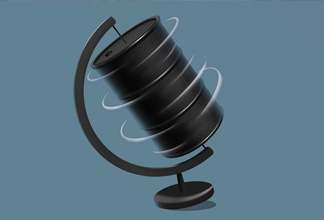Pay Yourself First: What Does it Really Mean?
Written by Sandra MacGregor
Published on October 12, 2017
minute read
Share:
We've all heard it a million times: One of the best ways to ensure you have enough savings to handle a major unexpected expense or enjoy a comfortable retirement is to pay yourself first. But while that golden rule of savings has a catchy ring to it, figuring out what it actually means and how it applies to your real life (and, more importantly, your real paycheque) is another matter entirely.
Financial whiz extraordinaire Warren Buffett summed it up when he said, "Don't save what is left after spending; spend what is left after saving."
"...paying yourself first isn't the same as spending money on yourself."
The pay-yourself-first philosophy espouses putting some money aside from each paycheque immediately, and only once that's done should we think about how we are going to allot what's left.
Often the idea of paying yourself first requires a mindset shift — including the idea that paying yourself first isn't the same as spending money on yourself.
Easier said than done, you say? Many Canadians seem to be of the same opinion. A recent study from the Canadian Payroll Association (CPA) indicates that Canadians prioritize spending over saving. According to the CPA's research, almost half of us are living paycheque to paycheque. A whopping 47 per cent of working Canadians say it would be tough to meet their financial obligations if their paycheque was to be delayed by even one week. For millennials in their 30s, the study found 55 per cent would have difficulty, while 51 per cent of Gen X-ers in their 40s felt the same way. These stats are all the more disconcerting given that most of us have certainly faced an expensive emergency — a broken down car or a sudden plumbing disaster, for example.
The CPA study found that this inability to save follows us right into our retirement years, with almost half of Canadians saying they will have to work even longer than they had planned before they can retire. Furthermore, 74 per cent have just one quarter or less of what they expect to need to retire. "And even among those closer to retirement (50 and older), a disturbing 47 per cent are still less than a quarter of the way to their retirement savings goal," the CPA study notes.
"A PAC (pre-authorized contribution plan) allows you to pay yourself first because you can direct money to your savings and investments automatically."
Though these statistics sound alarming, it's a timely reminder that it's never too late to modify spending habits. As noted by Janice MacLellan, the CPA's Vice-President of Operations, the results of the study, "...underscore the need for spending less and saving more every day, for emergencies and for retirement…They also show that it is very difficult for people to change or reduce their spending patterns. By Paying Yourself First...you are diverting money into a retirement or savings account before you have the opportunity to think about spending it."
Pre-authorized contribution plans, or PACs, can help with setting cash aside if you, like many of us, don't think you have the will power or organizational ability to tackle it each time a paycheque hits your account.
A PAC lets you pay yourself first because it can direct money to your savings and investments automatically. You get to determine the amount you earmark for your PAC — in general, financial experts recommend saving 10 per cent of your net income, but any amount (1 per cent, 3 per cent, 5 per cent...whatever you're comfortable with) can get you in the saving habit and give you a sense of how your savings can build.
"Financial experts often say most people spend their money in this order: bills, fun, saving."
What about bills, groceries, rent, etc? They're all priorities, of course, and paying yourself first doesn't mean those fall by the wayside. Financial experts often say most people spend their money in this order: bills, fun, saving. Bumping saving to the front of the line can mean finding some creative ways to still end up with some discretionary funds for the "fun" part of the budget.
Paying yourself first can make saving like a reflex, as automatic as breathing. And who wouldn't breathe a whole lot easier knowing there's a nest egg building for your financial goals?
*The title of this article was changed on October 17
RBC Direct Investing Inc. and Royal Bank of Canada are separate corporate entities which are affiliated. RBC Direct Investing Inc. is a wholly owned subsidiary of Royal Bank of Canada and is a Member of the Canadian Investment Regulatory Organization and the Canadian Investor Protection Fund. Royal Bank of Canada and certain of its issuers are related to RBC Direct Investing Inc. RBC Direct Investing Inc. does not provide investment advice or recommendations regarding the purchase or sale of any securities. Investors are responsible for their own investment decisions. RBC Direct Investing is a business name used by RBC Direct Investing Inc. ® / ™ Trademark(s) of Royal Bank of Canada. RBC and Royal Bank are registered trademarks of Royal Bank of Canada. Used under licence.
© Royal Bank of Canada 2025.
Any information, opinions or views provided in this document, including hyperlinks to the RBC Direct Investing Inc. website or the websites of its affiliates or third parties, are for your general information only, and are not intended to provide legal, investment, financial, accounting, tax or other professional advice. While information presented is believed to be factual and current, its accuracy is not guaranteed and it should not be regarded as a complete analysis of the subjects discussed. All expressions of opinion reflect the judgment of the author(s) as of the date of publication and are subject to change. No endorsement of any third parties or their advice, opinions, information, products or services is expressly given or implied by RBC Direct Investing Inc. or its affiliates. You should consult with your advisor before taking any action based upon the information contained in this document.
Furthermore, the products, services and securities referred to in this publication are only available in Canada and other jurisdictions where they may be legally offered for sale. Information available on the RBC Direct Investing website is intended for access by residents of Canada only, and should not be accessed from any jurisdiction outside Canada.
Explore More

What Investors Can Learn from Hockey Star and RBC Olympian Sarah Nurse
Nurse's path to the podium reveals how preparation, planning and practice can turn potential into a golden opportunity
minute read

Crude Questions? A Look at Canada’s Oil Economy
What you need to know about Canada’s oil industry
minute read

How Inflation-Proof Are Your Investments?
Why inflation still matters – and how to stay ahead of it
minute read
Inspired Investor brings you personal stories, timely information and expert insights to empower your investment decisions. Visit About Us to find out more.







